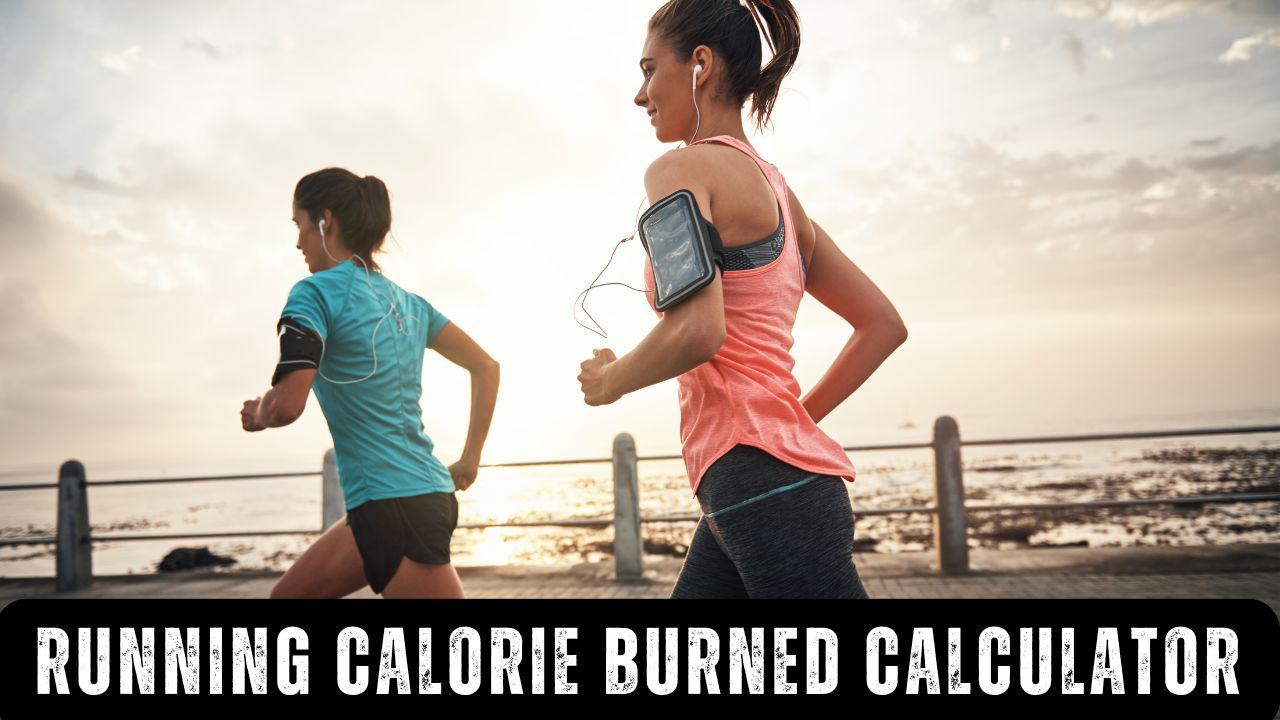Running Calorie Calculator
Scientific running energy expenditure calculator with advanced MET analysis and terrain adjustments

Science of Running Calorie Burn
Running is one of the most efficient exercises for burning calories, with energy expenditure varying significantly based on speed, body weight, terrain, and running efficiency. Landmark research published in Medicine & Science in Sports & Exercise demonstrates that running burns substantially more calories than walking at equivalent energy expenditure levels, making it an exceptional choice for weight management and cardiovascular fitness.
⚡ MET Values and Running Intensity
Our calculator uses scientifically validated MET (Metabolic Equivalent of Task) values derived from extensive research in exercise physiology. Running MET values range from 6.0 for light jogging (5 mph) to over 23.0 for competitive speeds (12+ mph). These values are based on oxygen consumption measurements and provide accurate estimates for calorie expenditure across different running intensities and individual characteristics.
🎯 Factors Affecting Running Calorie Burn
Multiple factors influence running energy expenditure: body weight (heavier individuals burn more calories), running speed (exponential increase with pace), terrain (hills increase expenditure by 15-60%), age (metabolic efficiency changes), and gender (physiological differences). Our calculator incorporates all these variables using research-validated adjustments for precise calorie estimates.
Running Calorie Formula & Methodology
Running Intensity Guidelines
| Intensity Level | MET Range | Heart Rate Zone | Breathing Pattern | Recommended Use |
|---|---|---|---|---|
| Light Running | 6.0-8.0 METs | 60-70% HRmax | Conversational | Recovery runs, base building |
| Moderate Running | 8.1-11.0 METs | 70-80% HRmax | Somewhat labored | Aerobic development, longer runs |
| Vigorous Running | 11.1-16.0 METs | 80-90% HRmax | Hard, rhythmic | Tempo runs, threshold training |
| Very Vigorous Running | 16.1+ METs | 90-100% HRmax | Very difficult | Intervals, race pace training |
Running Calorie Burn by Speed & Weight
| Running Speed | MET Value | 125 lbs (57kg) | 155 lbs (70kg) | 185 lbs (84kg) | Pace (min/mile) |
|---|---|---|---|---|---|
| 5.0 mph | 8.5 | 484 cal/hr | 596 cal/hr | 714 cal/hr | 12:00 |
| 6.0 mph | 9.3 | 529 cal/hr | 651 cal/hr | 781 cal/hr | 10:00 |
| 7.0 mph | 11.0 | 626 cal/hr | 770 cal/hr | 924 cal/hr | 8:34 |
| 8.0 mph | 12.0 | 683 cal/hr | 840 cal/hr | 1008 cal/hr | 7:30 |
| 9.0 mph | 13.0 | 740 cal/hr | 910 cal/hr | 1092 cal/hr | 6:40 |
| 10.0 mph | 14.8 | 842 cal/hr | 1036 cal/hr | 1243 cal/hr | 6:00 |
Note: Values shown are for flat terrain running. Calorie burn increases significantly with incline: +15% for slight inclines, +35% for moderate inclines, and +60% for steep inclines. Individual variations may occur based on running efficiency, fitness level, and environmental conditions.
How Many Calories Does Running Burn Over Time? 🏃♂️
📊 Time-Based Calorie Expenditure Analysis
Understanding calories burned during running over different time periods helps with workout planning and fitness goal setting. The following table shows estimated calories burned at moderate running intensity (7.5 mph / 12 km/h, approximately 11.5 METs) based on validated exercise physiology research.
| Duration | 140 lb (63.5 kg) | 165 lb (74.8 kg) | 190 lb (86.2 kg) | 215 lb (97.5 kg) | 240 lb (108.9 kg) |
|---|---|---|---|---|---|
| 15 minutes | 154 cal | 182 cal | 209 cal | 237 cal | 265 cal |
| 30 minutes | 308 cal | 363 cal | 418 cal | 473 cal | 529 cal |
| 45 minutes | 462 cal | 545 cal | 627 cal | 710 cal | 794 cal |
| 60 minutes | 616 cal | 726 cal | 836 cal | 946 cal | 1,058 cal |
| 90 minutes | 924 cal | 1,089 cal | 1,254 cal | 1,419 cal | 1,587 cal |
| 120 minutes | 1,232 cal | 1,452 cal | 1,672 cal | 1,892 cal | 2,116 cal |
Note: Values calculated using the corrected formula: Calories = (Time × MET × 3.5 × Weight) / 200 with 11.5 METs for moderate running pace. Individual results may vary based on fitness level, running efficiency, and environmental conditions.
How Many Calories Does Running Burn by Distance? 🏃♀️
📏 Distance-Based Calorie Analysis
Calorie burn per distance provides valuable insights for route planning and training goals. These estimates use moderate running intensity and are based on American Council on Exercise research demonstrating consistent calorie burn per mile regardless of speed for most runners.
| Distance | 140 lb (63.5 kg) | 165 lb (74.8 kg) | 190 lb (86.2 kg) | 215 lb (97.5 kg) | 240 lb (108.9 kg) |
|---|---|---|---|---|---|
| 1 mile (1.6 km) | 88 cal | 104 cal | 119 cal | 135 cal | 151 cal |
| 3.1 miles (5K) | 273 cal | 322 cal | 369 cal | 418 cal | 468 cal |
| 6.2 miles (10K) | 546 cal | 643 cal | 738 cal | 836 cal | 935 cal |
| 13.1 miles (Half Marathon) | 1,153 cal | 1,359 cal | 1,559 cal | 1,766 cal | 1,975 cal |
| 26.2 miles (Marathon) | 2,306 cal | 2,717 cal | 3,119 cal | 3,531 cal | 3,951 cal |
Note: Estimates based on moderate running pace (approximately 88 calories per mile per 100 pounds of body weight). Actual values vary with running speed, terrain, and individual efficiency.
How Long Should I Run to Burn 500 Calories? ⏱️
🎯 Time Required for 500-Calorie Burn
Burning 500 calories through running is a common fitness goal that varies significantly based on body weight, running speed, and terrain. This analysis uses scientifically validated MET values to calculate precise time requirements. Research from exercise physiology studies confirms these calculations provide accurate estimates for training and weight management planning.
| Body Weight | Light Jog (5 mph / 8 METs) | Moderate Run (6.5 mph / 10.5 METs) | Fast Run (8 mph / 13.5 METs) | Very Fast (10 mph / 16 METs) |
|---|---|---|---|---|
| 140 lb (63.5 kg) | 89 minutes | 68 minutes | 53 minutes | 45 minutes |
| 165 lb (74.8 kg) | 76 minutes | 58 minutes | 45 minutes | 38 minutes |
| 190 lb (86.2 kg) | 66 minutes | 50 minutes | 39 minutes | 33 minutes |
| 215 lb (97.5 kg) | 58 minutes | 44 minutes | 34 minutes | 29 minutes |
| 240 lb (108.9 kg) | 52 minutes | 40 minutes | 31 minutes | 26 minutes |
Note: Times calculated using the corrected formula: Calories = (Time × MET × 3.5 × Weight) / 200. Add 10-15% for uphill running or carrying additional weight. Individual efficiency may affect actual times required.
Scientific Research & Evidence
🔬 Landmark Running vs. Walking Study
“Greater Weight Loss from Running than Walking during 6.2-yr Prospective Follow-up”
Medicine & Science in Sports & Exercise Research –
This groundbreaking 6.2-year study of 47,453 participants demonstrated that running produces significantly greater weight loss
than walking for equivalent energy expenditure. The research showed 90% greater weight loss per MET-hour for running
versus walking, validating running as a superior calorie-burning exercise for long-term weight management.
⚡ Running Energy Expenditure Analysis
Metabolic Cost and Efficiency of Running
Research consistently demonstrates that running energy expenditure increases exponentially with speed, not linearly.
Studies show that doubling running speed can triple calorie burn, making pace selection critical for training goals.
The metabolic cost of running also varies significantly with factors like running economy, biomechanics, and environmental conditions.
🏃♀️ Gender and Age Factors in Running
Individual Variations in Running Energy Expenditure
Research indicates that males typically have 5-7% higher metabolic rates during running due to greater muscle mass and
different body composition. Age-related changes in running economy become apparent after age 50, with older adults
requiring 8-12% more energy for the same pace due to decreased muscular efficiency and cardiovascular changes.
Optimizing Your Running for Maximum Calorie Burn
🏔️ Terrain Strategies
Hill Running: Incorporate inclines to dramatically increase calorie burn. Even a 1-3% grade increases
energy expenditure by 15%, while steep hills (7-10%) can boost calorie burn by 60%.
Strength training
can improve your hill running capacity.
Trail Running: Uneven terrain increases calorie burn by approximately 25% compared to road running
due to stabilization demands and varied movement patterns.
⚡ Interval Training for Enhanced Calorie Burn
High-Intensity Intervals: Alternating between high and moderate intensity running maximizes calorie burn
both during exercise and post-exercise (EPOC effect). Short bursts at higher speeds can increase overall session calorie burn
by 15-25%.
Tempo Runs: Sustained efforts at comfortably hard pace (threshold intensity) optimize fat burning while
maintaining high calorie expenditure rates throughout longer sessions.
💪 Supporting Your Running Performance
Strength Training: Regular resistance training improves running economy and power, allowing for
higher intensity efforts. Our leg strengthening exercises
are specifically designed for runners.
Core Stability: A strong core improves running efficiency and reduces energy waste.
Core strengthening exercises
complement your running training perfectly.
Running Calorie Calculator FAQs 🏃♂️
❓ How accurate is the running calorie calculator?
Our calculator uses the scientifically validated formula: Calories = (Time × MET × 3.5 × Weight) / 200, combined with research-based MET values from exercise physiology studies. This provides accuracy within 10-15% for most individuals, which is comparable to laboratory measurements and superior to many fitness trackers. Research demonstrates that MET-based calculations are highly reliable for estimating running energy expenditure across diverse populations and running speeds.
🏃 Does running speed affect total calorie burn?
Yes, significantly. Running speed affects both calorie burn rate (calories per minute) and total time required to cover a distance. However, research shows that calorie burn per mile remains relatively consistent across speeds for individual runners, with faster speeds burning calories more quickly but requiring less time.
🏃♀️ Why does running burn more calories than walking?
Running requires greater muscle activation, higher oxygen consumption, and more energy to propel the body forward and maintain biomechanical efficiency at speed. The vertical oscillation and ground reaction forces in running create significantly higher metabolic demands than the more efficient walking gait pattern, resulting in exponentially higher calorie burn rates.
⛰️ How much do hills and inclines increase calorie burn?
Incline dramatically increases calorie expenditure. Our calculator applies terrain factors: slight incline (+20%), moderate incline (+40%), steep incline (+60%). These factors are based on research showing that each 1% grade increase requires approximately 6-10% more energy expenditure depending on running speed. Trail running increases burn by 25% due to uneven surfaces requiring additional stabilization and varied movement patterns, while downhill running reduces calorie burn by approximately 15%.
🎒 How does carrying weight affect calorie burn?
Carrying additional weight increases calorie burn proportionally. Our MORE OPTIONS feature accounts for backpack weight, applying approximately 2% increase per kilogram carried. Research shows this linear relationship holds for loads up to 15-20% of body weight, making the calculator accurate for typical running scenarios.
👤 Why do age and gender affect the calculations?
Age affects metabolic efficiency, with adults over 50 typically requiring 8% more energy, and those over 65 requiring 12% more energy for equivalent running speeds. Gender differences relate to average metabolic rate variations and biomechanical efficiency, with our calculator applying a 5% decrease for females based on research showing males typically have 5-7% higher metabolic rates.
⚡ Should I focus on speed or duration for maximum calorie burn?
Both speed and duration contribute to total calorie expenditure, but the relationship isn’t linear. Higher speeds exponentially increase calorie burn rate, while longer durations increase total burn. For maximum calorie burn, incorporate both: longer moderate-intensity runs for volume and shorter high-intensity sessions for rate. Your fitness level and goals should guide the optimal balance.
📱 Can I share my results for fitness tracking?
Yes! Our sharing feature allows you to share results via social media, messaging apps, or copy detailed analysis to your clipboard. The export function creates CSV files compatible with fitness apps, training logs, and healthcare consultations, making it easy to track progress and share with trainers or medical professionals. Use this URL to share the tool: https://fitliferegime.com/running-calorie-calculator/
⚕️ Medical Disclaimer
This running calorie calculator provides estimates based on validated scientific formulas and should not replace professional medical or fitness advice. Individual results may vary due to genetics, fitness level, running economy, medical conditions, medications, and environmental factors. Calorie estimates are most accurate when combined with comprehensive fitness assessments including cardiovascular health, biomechanical analysis, and metabolic testing. The intensity guidelines are based on population studies and may not apply to all individuals. Consult with healthcare professionals, certified running coaches, or sports medicine specialists before beginning intensive running programs, especially if you have pre-existing health conditions or injuries. This tool is for educational and informational purposes only.
References
- Ainsworth BE, Herrmann SD, Jacobs Jr. DR, Whitt-Glover MC, Tudor-Locke C. A brief history of the Compendium of Physical Activities. Journal of Sport and Health Science, 2024;13(1): 3-5.
- Herrmann SD, Willis EA, Ainsworth BE, Barreira TV, Hastert M, Kracht CL, Schuna Jr. JM, Cai Z, Quan M, Tudor-Locke C, Whitt-Glover MC, Jacobs DR. 2024 Adult Compendium of Physical Activities: A third update of the energy costs of human activities. Journal of Sport and Health Science, 2024;13(1): 6-12.
- Conger SA, Herrmann SD, Willis EA, Nightingale TE, Sherman JR, Ainsworth BE. 2024 Wheelchair Compendium of Physical Activities: An update of activity codes and energy expenditure values. Journal of Sport and Health Science, 2024;13(1): 18-23.
- Wilkin LD, Cheryl A, Haddock BL. Energy expenditure comparison between walking and running in average fitness individuals. J Strength Cond Res. 2012 Apr;26(4):1039-44. doi: 10.1519/JSC.0b013e31822e592c. PMID: 22446673.
- Williams PT. Greater weight loss from running than walking during a 6.2-yr prospective follow-up. Med Sci Sports Exerc. 2013 Apr;45(4):706-13. doi: 10.1249/MSS.0b013e31827b0d0a. PMID: 23190592; PMCID: PMC4067491.
- Okmayura, Finanta & Jefiza, Adlian & Ramadhani, Witri. (2020). The Calorie Burning Calculation System in Jogging Using a Thresholding-Based Accelerometer Sensor. Kinetik: Game Technology, Information System, Computer Network, Computing, Electronics, and Control. 5. 103-110. 10.22219/kinetik.v5i2.1005.
- Panwar, Punita & Bhutani, Kanika & sharma, Rimjhim & Saini, Rohit. (2023). A Study on Calories Burnt Prediction Using Machine Learning. ITM Web of Conferences. 54. 10.1051/itmconf/20235401010.
- Willis EA, Herrmann SD, Hastert M, Kracht CL, Barreira TV, Schuna Jr. JM, Cai Z, Quan M, Conger SA, Brown WJ, Ainsworth BE. Older Adult Compendium of Physical Activities: Energy costs of human activities in adults aged 60 and older. Journal of Sport and Health Science, 2024;13(1): 13-17.

Manish is a NASM-certified fitness and nutrition coach with over 10 years of experience in weight lifting and fat loss fitness coaching. He specializes in gym-based training and has a lot of knowledge about exercise, lifting technique, biomechanics, and more.
Through “Fit Life Regime,” he generously shares the insights he’s gained over a decade in the field. His goal is to equip others with the knowledge to start their own fitness journey.
